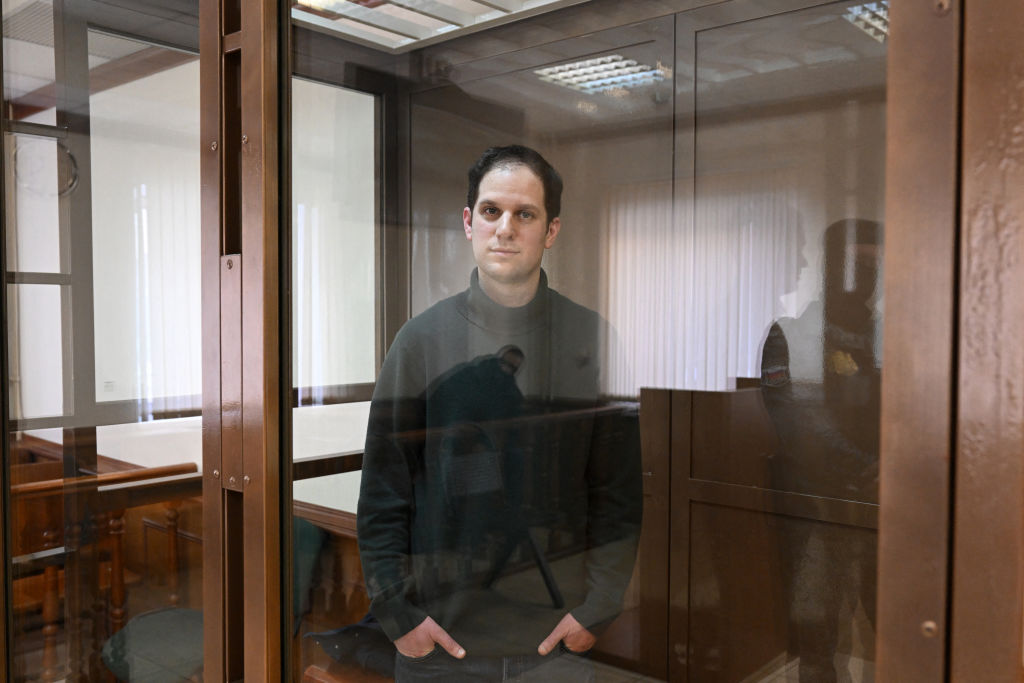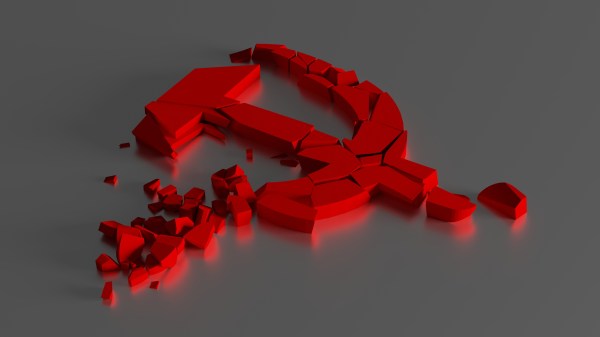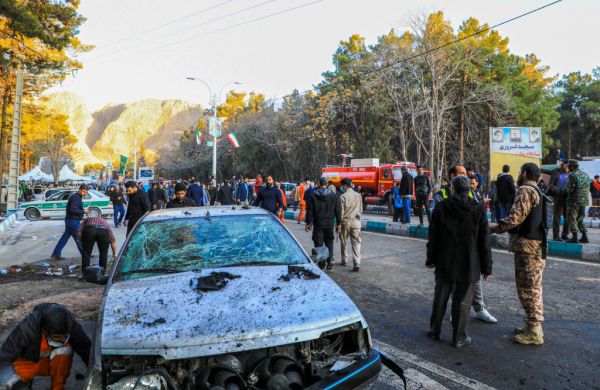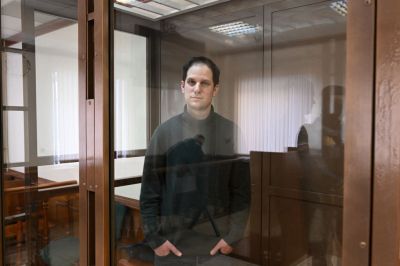In Russia, the trial—“trial”—of Wall Street Journal reporter Evan Gershkovich is under way.
The “trial” is being held in secret, though Gershkovich was displayed—locked in a glass box with his head shaved—for the benefit of the press and the amusement of the Russian people. U.S. Embassy personnel have been banned from the proceedings, as have Gershkovich’s supporters, as have reporters, as have all others who are not carefully pre-screened participants in the show-trial pageant being put on by the state security apparatus. Gershkovich is charged with espionage. There is no evidence that Gershkovich was involved in anything other than journalism, but if you are Vladimir Putin, journalism—real, honest journalism—is at least as much of a danger to your regime as is espionage, and probably more of one.
Mark Leonard of the European Council on Foreign Relations offers a useful analogy: In the era of globalization, rival countries end up being something like estranged spouses who use the things that link them together—the children, the family home—as weapons against one another. We have seen this with trade, with travel, with participation in multinational institutions, and much else. And we have seen it with journalism. The foreign correspondent is as ancient a figure in international relations as the diplomat, and it is an increasingly dangerous occupation. Authoritarians fear journalists, for obvious reasons. The so-called People’s Republic of China is a prolific jailer of domestic journalists—half of them Uyghurs—and Beijing has made a special example out of Hong Kong media entrepreneur Jimmy Lai, who is a British national. Like Gershkovich, Lai is accused of espionage: “collusion with foreign forces” and “illegally supplying state secrets overseas.”
As George Orwell doesn’t seem to have actually said, news is what they don’t want you to print—the rest is advertising. And those are good, bold, true words, but a tough credo to live up to when the people who don’t want you printing things have a gestapo and a gulag and Polonium-210.
The Russian show trial is an established national tradition. It is a feature of whatever we want to call the form of government practiced by Putin. It was a feature of the communist regime that preceded the current era, and it was a feature of the czarist regime that preceded the communists. Russia has had many revolutions of sorts, but wherever it has gone, it has found itself there. As the Economist once put it: “Peter the Great, tsar from 1682 to 1725, set out to modernise a medieval theocracy, and produced a militaristic police state based on slave labour.”
Peter the Great would recognize what is being done to Evan Gershkovich, as he, too, constructed special displays for his political enemies: stone pillars with iron prongs radiating out from them, upon which we hung the heads of those who got on the wrong side of the czar. His former brother-in-law was decapitated and his head displayed on such a structure in St. Petersburg for years; there was still some of it left when the deposed governor of Siberia was pinned up next to it. These Russian “spectacles of suffering” were not just manifestations of psychotic cruelty—they were intentional strategies of statecraft.
And so it goes. Russia is not a failed state but a series of failed (and failing) states, with something much more enormously failed behind them.
The perversity of the contrast between Russian culture and Russian public life should be held onto as a kind of civilizational memento mori by those of us who have, over the years, made the profound error of investing our hopes in intellect and high culture. Russia has those gifts in excess: in literature, in music, in science, in philosophy—in almost everything except creating the conditions under which ordinary life may be lived decently and securely by ordinary people. It is as though Russian public life knows how to create only geniuses and monsters, along with a few men who were both.
But Americans can no longer allow ourselves to be shocked by that: If we did not learn the lesson of Germany—when the most cultured, urban, and educated elements of Europe’s most intellectually advanced country carried out the Holocaust—then we have our own contemporary example, less monstrous but no less illuminating. Men of culture and intellectual achievement have proven to be easily seduced by the scanty rewards—a little bit of money and some transitory notoriety—that go along with being the house philosophers of the Trump movement.
If not intellect and culture, then what is reliable proof against illiberalism, tyranny, and monstrosity? Catholics could not be tempted for a second to indulge the notion that our religion nurtures the kind of civilizations that are resistant to that sort of thing—cf. Franco, Pinochet, Salazar, Trujillo, Mussolini, etc.—but the heirs of the Reformation can hardly have failed to notice that so many “neutral” Protestant countries (Denmark, Norway, Sweden) found it relatively easy to establish a modus vivendi with the Third Reich. Danish resistance to the Nazi occupation lasted only two hours, during which time the Danes seem to have inflicted ... zero casualties, though they did capture two Germans.
So: Not intellect, not high culture, not religion. In what should Americans trust? The Constitution? Maybe. But it is worth noting that the same element in American life that cheers on Putin’s forces in Ukraine is also cheering on the effort to elect as the next president of these United States a man who not long ago insisted that the Constitution must face “termination” if its rules would keep him out of office.
I think our best defense is the people in Evan Gershkovich’s business—I mean the actual journalists, not the rodeo clowns who play at journalism. (Putin has suggested he is open to a prisoner swap for Gershkovich; the inconvenient fact is that the best candidate for such a swap, a man who is much more valuable to Putin than he is to us—I mean, of course, Tucker Swanson McNear Carlson—is not a prisoner.) Thomas Jefferson thought so: “Were it left to me to decide whether we should have a government without newspapers, or newspapers without a government, I should not hesitate to prefer the latter.”
There is a reason Vladimir Putin cannot abide Evan Gershkovich and those who do that kind of work. God bless and keep them.







Please note that we at The Dispatch hold ourselves, our work, and our commenters to a higher standard than other places on the internet. We welcome comments that foster genuine debate or discussion—including comments critical of us or our work—but responses that include ad hominem attacks on fellow Dispatch members or are intended to stoke fear and anger may be moderated.
With your membership, you only have the ability to comment on The Morning Dispatch articles. Consider upgrading to join the conversation everywhere.